One Hundred Years
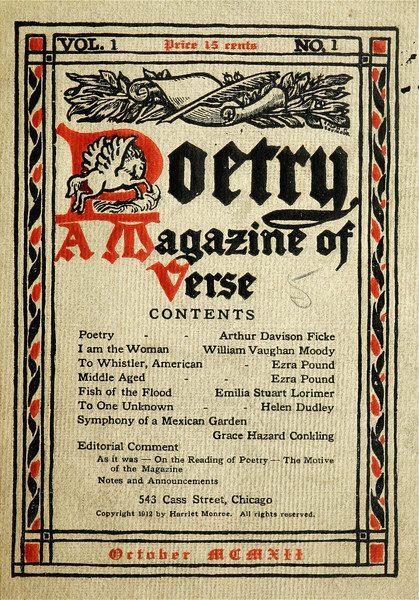
One hundred years ago this month, Harriet Monroe published the first issue of Poetry in Chicago. To mark the occasion, we've put together a little history of how Poetry has celebrated its many anniversaries over the years:
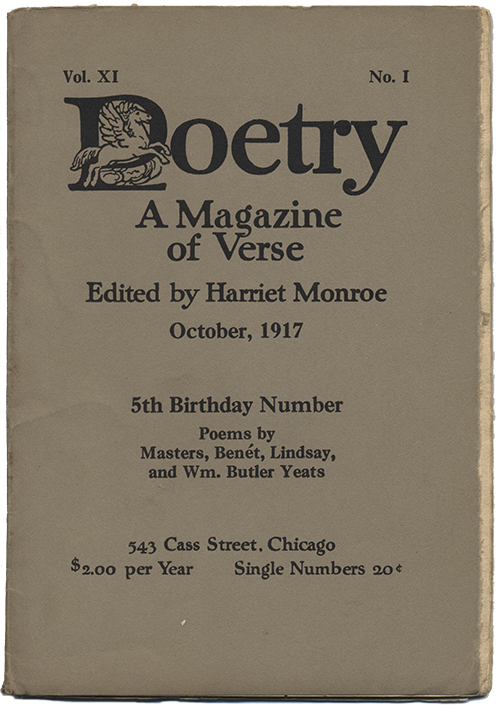
October 1917
POETRY may not be a grand enough portal, and the lamps that light it may burn dim in drifting winds; but until a nobler one is built it should stand, and its little lights should show the way as they can.
— Harriet Monroe, "These Five Years"
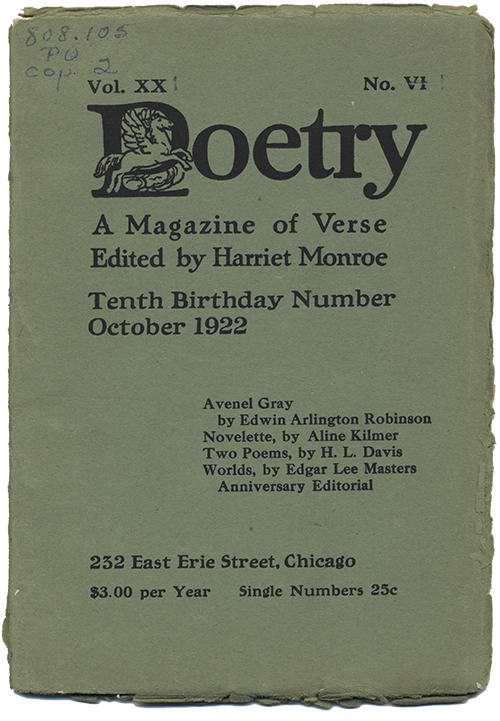
October 1922
Ten years, as we said above, are a long time, measured by events of literary history; and may be multiplied indefinitely by human memory. Whether the magazine will be recorded in the history of twentieth-century literature only the future can decide… Whether we cease tomorrow or continue another decade, we shall hope that such endeavors for the art may go on—under abler minds and ever more liberal auspices.
— Harriet Monroe, "Ten Years Old"
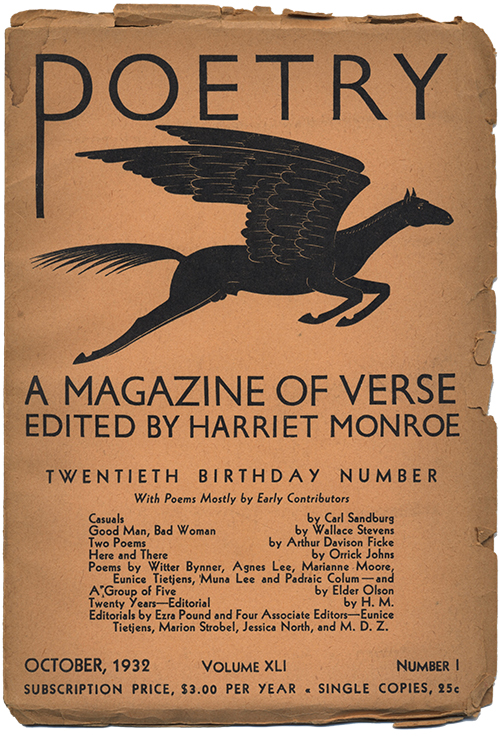
October 1932
If the great American people can’t maintain the one special review that has for twenty years carried on in Chicago, the country is not worth boat-fare to visit.
— Ezra Pound, “Manifesto”
Poems by Witter Bynner, Marianne Moore, Muna Lee, Carl Sandburg, and others.
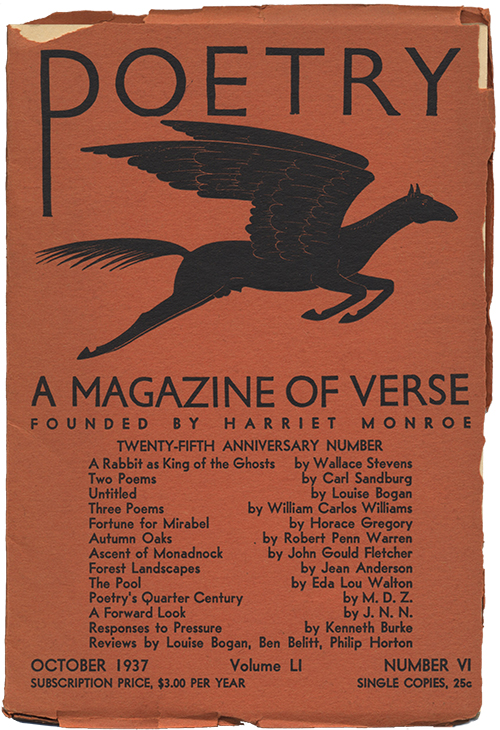
October 1937
Poetry's task today is far different from that of twenty-five years ago—as different, in most respects, as the world of 1937 is unlike the last years of the Great Peace that was to end in 1914… Today the temper of literature, no less than of politics and society, is more critical, more hardened in skepticism and doubt, more suspicious of the outward shows of bravery, more keenly sharpened by doubt, grief, and disillusionment. It is impossible to expect poetry to show the fresh face and undiscouraged optimism, or even the complete confidence in its duty to society, that it showed when the contemporary movement was young.
— Morton Dauwen Zabel, “Poetry’s Quarter Century”
Includes Wallace Stevens’s “A Rabbit as the King of Ghosts,” Louise Bogan’s “Untitled,” Robert Penn Warren’s “Bearded Oaks,” and others.
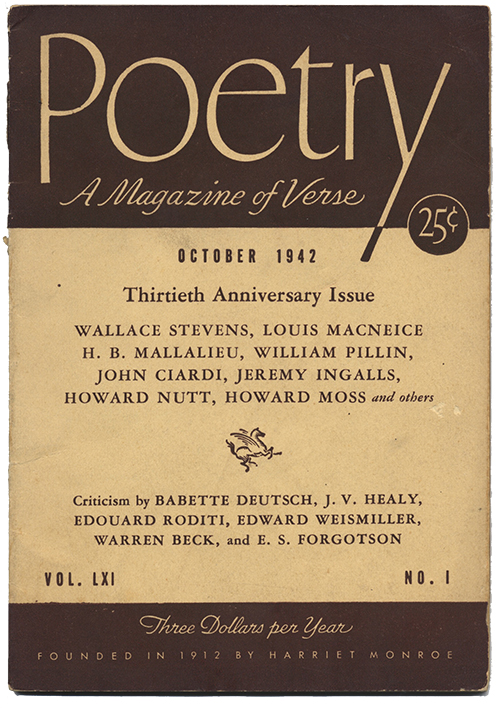
October 1942
Returning to active duty after five years' absence, I am impressed chiefly by the continued importance of the magazine in a world at war. The cataclysm, by shutting off so many other outlets for poetic expression, has directed the flood waters to America—to the Middle West, to Chicago, to POETRY. How strange to sit at a safe and orderly desk in a city as yet unbombed, opening envelopes from poets on the battlefronts of the world!
— Jessica Nelson North, “The Magazine Today”
Poems by Louis MacNeice, John Ciardi, Howard Moss and others.
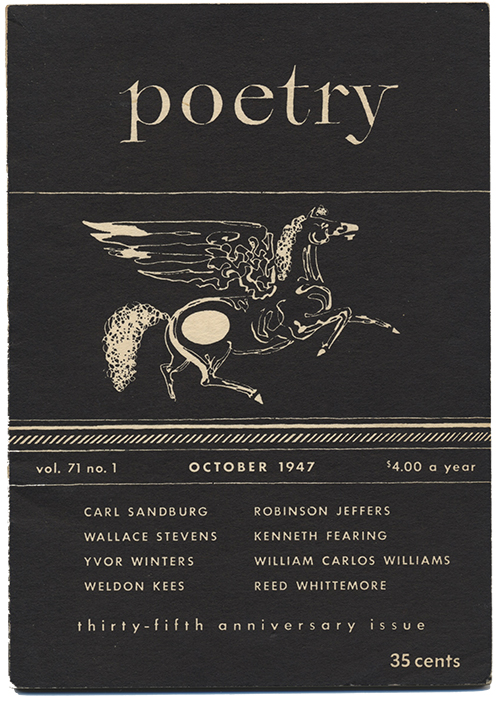
October 1947
For, of course, all the traditional touches which we are at such pains to preserve, all the ghosts which nostalgically haunt us, are treasures which concern us consciously less than those we may never find. Yesterday’s poet, whom we love, is not the on we are looking for.
— Marion Strobel, "543 Cass Street"
Includes poems by Yvor Winters, Weldon Kees, Robinson Jeffers, William Carlos Williams, and others.
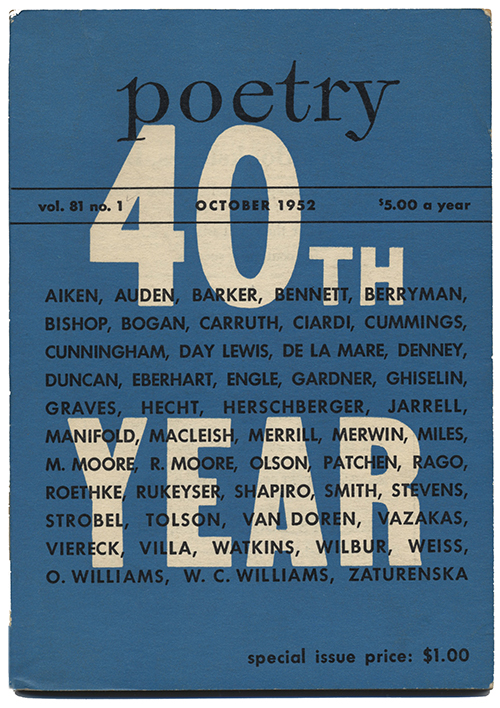
October 1952
We do not feel that a recital of our history is in order today, but we would like to reaffirm our purpose as the first and longest-lived magazine of verse. Our aims are to serve those poets who create the literary and spiritual canon of our age; to provide them with a place of their own in which to show their work; to discover new poets; to pay for poetry; and through awards, publicity, and criticism, to make these poets known to and understood by their contemporaries.
These were the aims of Harriet Monroe, and we are proud to dedicate this number of POETRY to her memory”
— The Editors
Includes W.H. Auden’s “Shield of Achilles,” John Berryman’s “Sonnet 25,” Elizabeth Bishop’s “The Mountain,” Randall Jarrell’s “The Survivor among Graves,” Marianne Moore’s “Then the Ermine,” Kenneth Patchen’s “But of Life?” William Carlos William’s “Paterson, Book V” and much, much more.
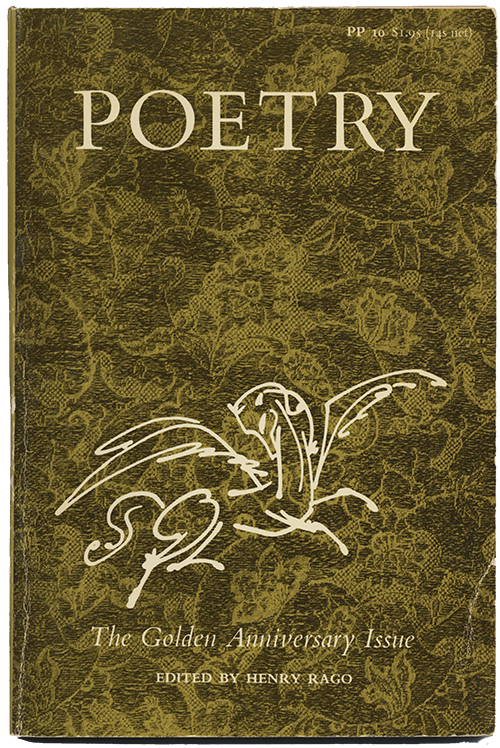
October 1962
During this especially noisy decade we have been invited many times to choose between energy and form, or sentiment and reason, or sympathy and judgment, or however the ancient dichotomy might be translated; sometimes for one side in the name of "life," sometimes for the other in the name of "elegance." A good poet has nothing to do with such a choice; his poem is what he chooses; it is, exactly, the ordeal of these elements: it is the suffering and the adjudication.
— Henry Rago, “Foreword”
Includes poems by Robert Creeley, Robert Duncan, Anthony Hecht, Denise Levertov, Robert Lowell, Muriel Rukeyser, Delmore Schwartz, Anne Sexton, James Wright, Louis Zukovsky, and many, many others.
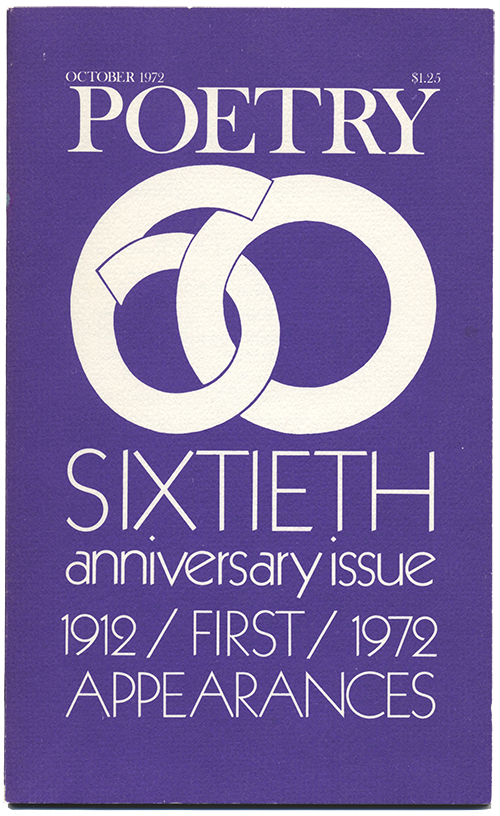
October 1972
Reprints of poems that marked poet’s first appearances, including Hart Crane’s “At Melville’s Tomb, “ Ted Hughes’s “Bawdry Embraced,” James Joyce’s “Night Piece,” D.H. Lawrence’s “Birthday,” Howard Nemerov’s “Sigmund Freud,” Sylvia Plath’s “Metamorphosis,” Gertrude Stein’s “Stanzas in Meditation,” and many others.
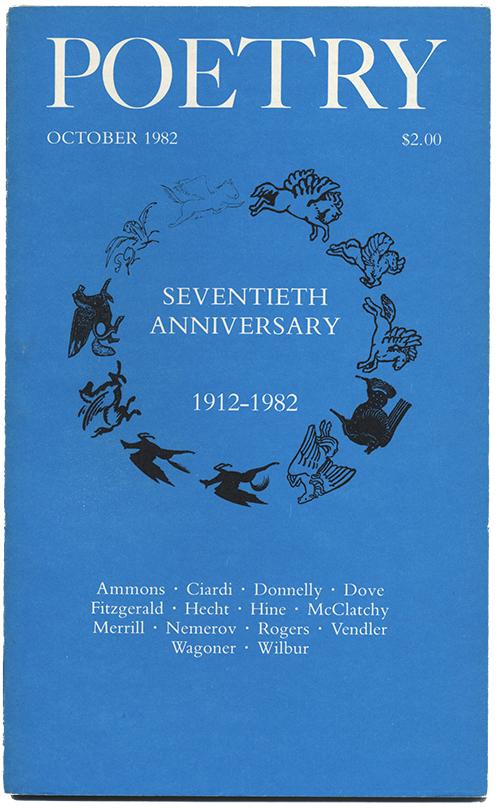
October 1982
With poems by A.R. Ammons, Rita Dove, Richard Wilbur, and others.
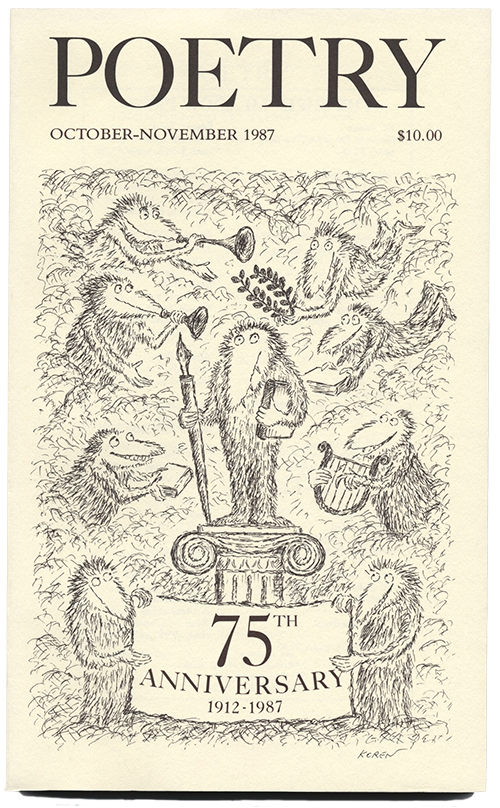
October 1987
Includes too many poems to name, and prose by dozens of the poets, including Gwendolyn Brooks, Raymond Carver, John Ashbery, Joyce Carol Oates, Thom Gunn, Linda Pastan and Wallace Fowlie, in which they recall their first encounters with Poetry.
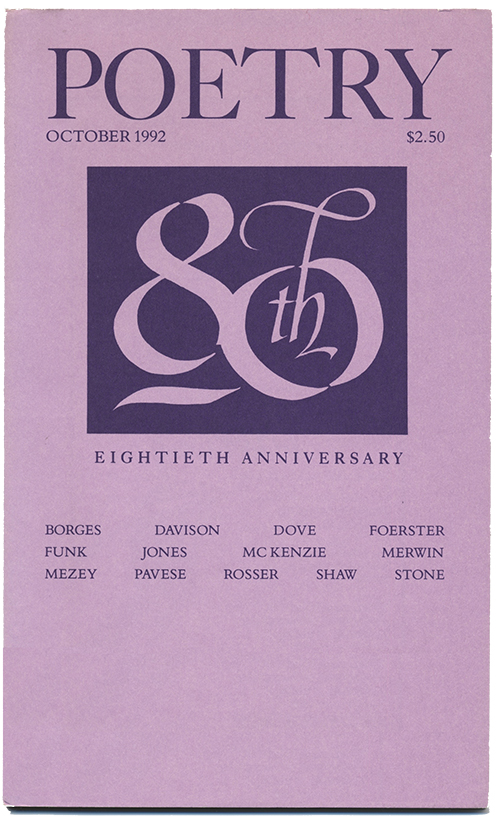
October 1992
Features poems by Jorge Luis Borges, Cesare Pavese, J. Allyn Rosser, and others.
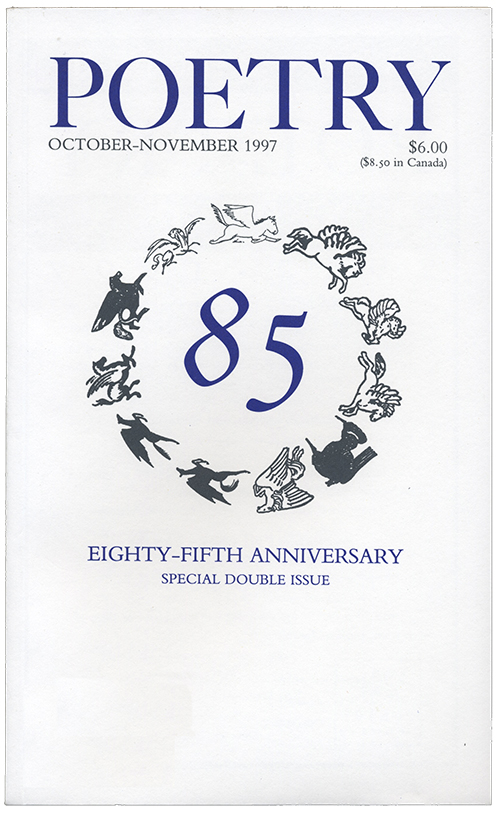
October 1997
Poems by John Ashbery, Stephen Dunn, Alice Fulton, Seamus Heaney, Yusef Komunyakaa, W.S. Merwin, Lisel Mueller, Kay Ryan, Ruth Stone, Wislawa Szymborska, and many others.
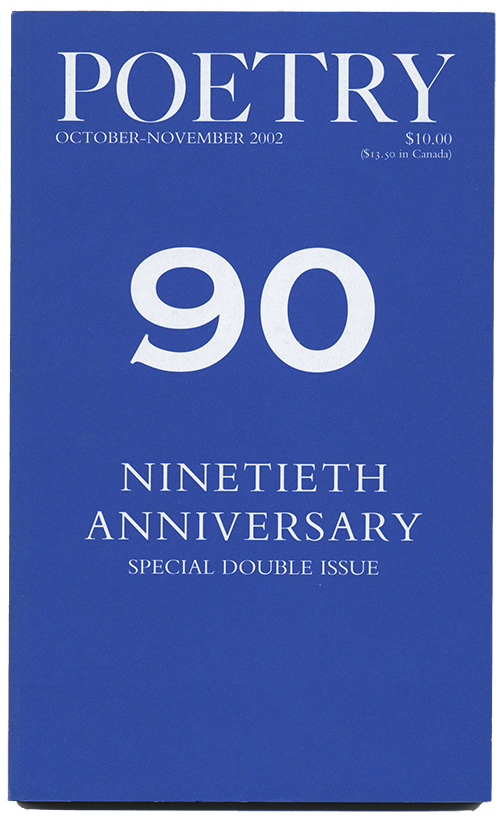
October 2002
Poems by Robert Bly, Sandra M. Gilbert, Carolyn Kizer, Kenneth Koch, Philip Levine, William Logan, Les Murray, Linda Pastan, Robert Pinsky, Gary Soto, James Tate, and many others.
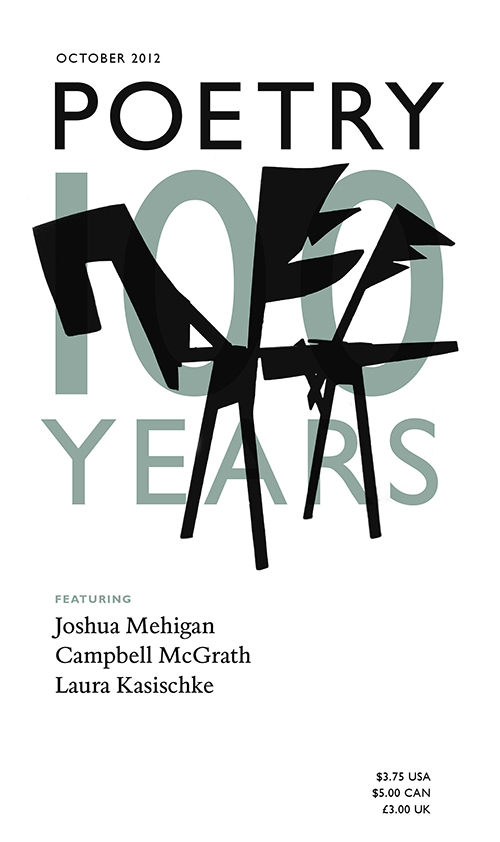
October 2012
For all the canons and anthologies, for every rock-solid reputation and critical consensus, poetry is personal or it is nothing. That is, until a poem has been tested on your own pulse, to paraphrase John Keats, until you have made up your own mind and heart about where you stand in relation to it, and it to you — until this happens, all poetry is merely literature, all reading rote.
— Christian Wiman, “Mystery and Mastery: Twenty-One Ways to Read a Century”
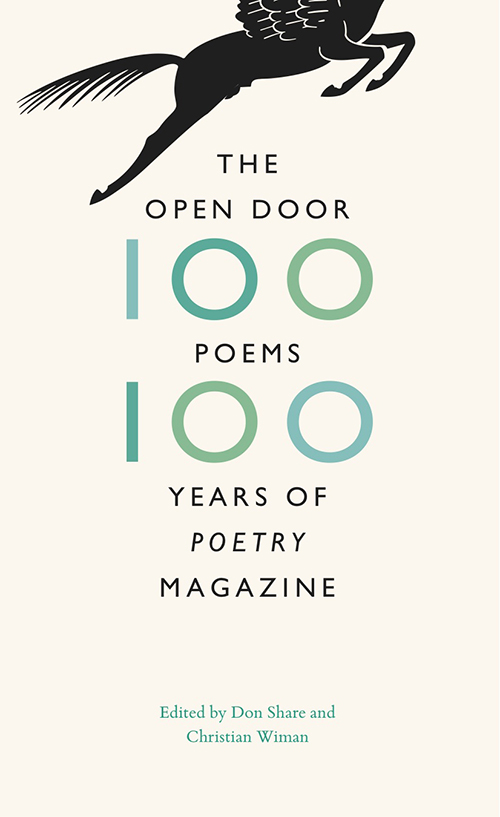
That excerpt comes from an article in Poetry's October 2012 issue. It is a modified version of the introduction to Poetry's new anthology: The Open Door: 100 Poems, 100 Years of Poetry Magazine, edited by Don Share and Christian Wiman.
You can purchase a copy of the anthology online, or, if you're in Chicago, at the Poetry's centennial party tonight. There will be readings from the anthology, a special Hippocrene cocktail, the new Pegasus sculpture by Bernard Willams (who also designed our October cover), and plenty to celebrate. We hope you'll join us!


